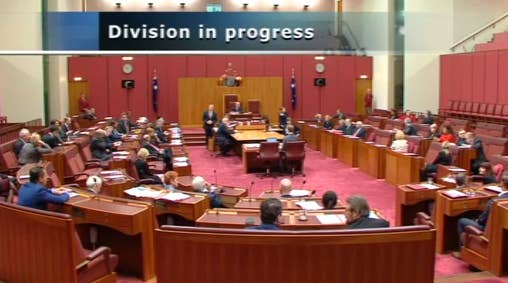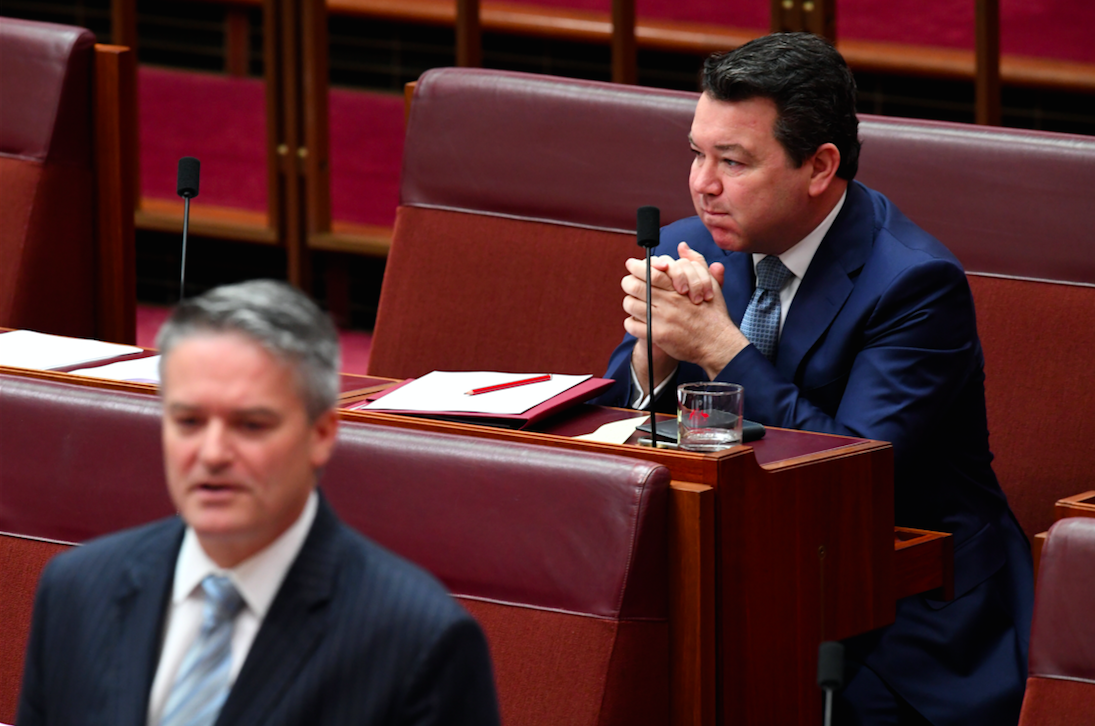The government's controversial postal vote on same-sex marriage is headed to the High Court, with advocates announcing a legal challenge just hours after the Senate voted down further consideration of the compulsory plebiscite on Wednesday.
BREAKING: Same-sex marriage advocates announce High Court challenge to postal plebiscite.
The three litigants in the suit will be the independent member for Denison, Andrew Wilkie; the national spokesperson for Parents and Friends of Lesbians and Gays, Shelley Argent; and Victorian mum of three and Rainbow Families Victoria convenor, Felicity Marlowe.
They will be represented by Ron Merkel QC. The suit is expected to be filed in the next 24 hours.
The government announced its plans for the voluntary postal vote on Tuesday, saying that ballots for the $122 million vote could start arriving in letterboxes as early as September 12.
The vote, which finance minister Mathias Cormann described as a "survey", will be conducted by the Australian Bureau of Statistics, rather than the Australian Electoral Commission — news that many found surprising.
The government believes it has the constitutional power to fund the vote under a clause in the current Appropriations Act that allows up to $295 million of taxpayer money to be spent on "urgent" and "unforeseen" circumstances.
Long-time marriage equality advocate Rodney Croome said in a press conference on Wednesday that, in Merkel's point of view, there are many points of the government's plan that may be unconstitutional.
BuzzFeed News understands there are three main tenets to the legal challenge: whether the ABS has the authority to collect the data it has been asked to by the government, whether it qualifies as an urgent and unforeseen expense under the Appropriations Act, and a third point on the Commonwealth exceeding its powers.
Wilkie said it was "truly frightening" to see the government try and bypass the parliament in this way.
"From my point of view, it's about governance ... about the parliament exercising its authority," he said.
Marlowe said she had joined the suit because she was "desperately worried" about the impact a plebiscite campaign would have on same-sex parented families.
"There are many, many families out there that are standing here today anxious and worried about the impact in their schoolyards, sporting communities, local neighbourhoods — even just thinking about people letter-boxing up and down their street," she said.

Earlier on Wednesday, the Senate knocked back the government's second attempt to hold a compulsory national plebiscite on the issue.
The vote to return the plebiscite bill for debate went down 31-31 (tied votes in the Senate are resolved in the negative), with Labor, the Greens and the Nick Xenophon Team voting against and the government and other crossbenchers voting for the motion.
It was not a vote on the bill itself, but on whether it should be returned to the Senate notice paper for further debate.
Finance minister Mathias Cormann argued for the Senate to "reconsider" the plebiscite after voting it down last year.
He said the government "trusts the Australian people" to have a civil debate.
"I'm not a bigot or a bad person because I happen to think the definition of marriage should be another way," he told the chamber.
Cormann said a compulsory attendance plebiscite was the government's preferred option to allow all Australians to have a say on the contentious issue, with a "diversity of views" in the public as well as the parliament.
Government senator Dean Smith, who sat in the chamber for the debate, is opposed to the plebiscite but voted with the government to return it to the notice paper for debate.

Opposition leader in the Senate Penny Wong criticised the government for suggesting the public debate would be respectful.
"I tell you: have a read of some of the things which are said about us and our families and then come back here and tell us this is a unifying moment," she said.
"The Australian Christian Lobby described our children as 'the stolen generation'. We love our children, and I object — as does every person who cares about children and as do all those same-sex couples in this country who have kids — to being told that our children are a 'stolen generation'. You talk about unifying moments? That's not a unifying moment. It's exposing our children to that kind of hatred."

